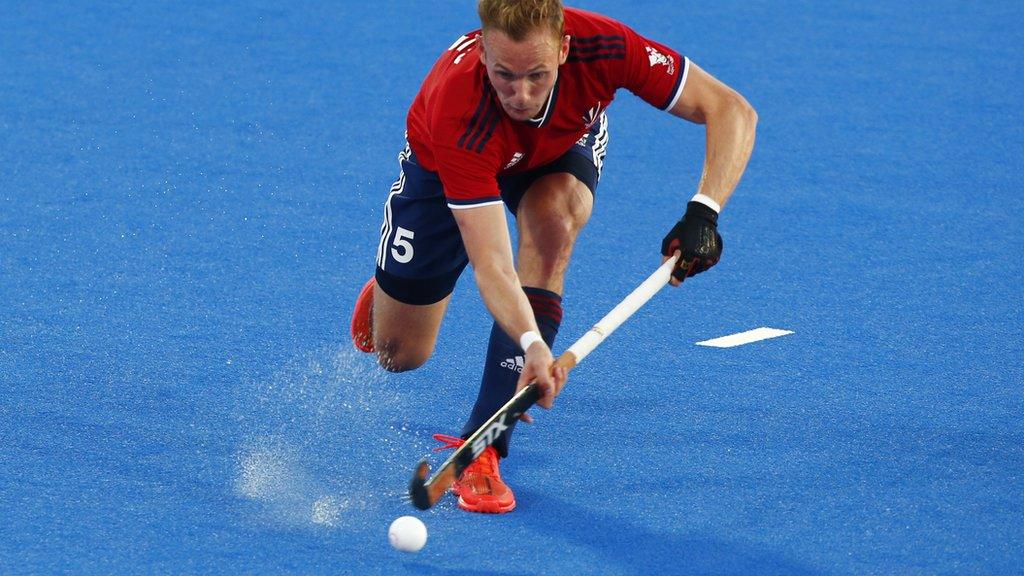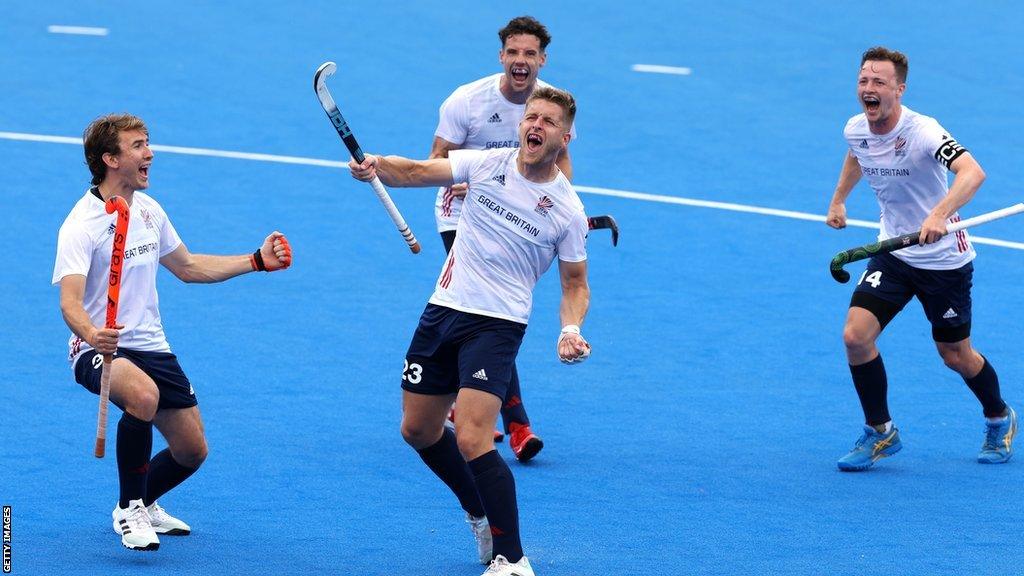Paris 2024 Olympics: 'Transformed' GB men's hockey team confident of qualification
- Published

Ames said winning European silver has been a game-changer for GB men's hockey
Olympic hockey qualifiers | |
|---|---|
Venue: Muscat (men) and Valencia (women) Dates: 13-21 January Coverage: All Great Britain matches - starting with GB women v Canada on Saturday, 13 January from 08:30 GMT - will be streamed live on the BBC iPlayer and BBC Sport website and app. Details. |
"We've never known what it's like to win a gold or be in a final, apart from asking the girls," explains Great Britain hockey men's captain David Ames.
"Now, though, we're able to not just compete, but pretty much beat anyone on their home patch."
Since making his Great Britain debut in 2015, Ames has experienced the "devastating" lows of early eliminations at the past two Olympics, while being a first-hand witness to GB women winning medals at each Games.
Last year, however, he guided a "transformed" men's team to a landmark European silver.
The squad will head into their Olympic qualification tournament in Oman confident of taking a crucial step towards not only to the Games, but to the Paris 2024 podium.
According to Ames, Great Britain's new-found belief comes from a new philosophy, which includes - but is not limited to - factors such as:
Culture - learning from approaches the GB women's team adopted to boost their Olympic medal-winning run at recent Games.
Character - utilising a psychologist who has worked with Marcus Rashford to address 'stereotypes as well as taboos' in men's sport and improve player wellbeing.
Creativity - international coaches have been allowed to "spread their wings" and use their experience to devise innovative training as well as tactical approaches.
The men's and women's Olympic qualifiers are being shown live on the BBC and GB men face Pakistan on 15 January, before they take on Malaysia on the 16th and China on the 18th in the group stages.
They must progress through this group phase, several knockout stages and record a top-three finish, to secure a place in Paris.
'It's no longer about who wants to be top dog'
The GB women's first Olympic hockey title at Rio 2016 highlighted not only their progress, but just how much the men, who finished second bottom of their group, had regressed since both reached the semi-finals at London 2012.
It led to a "brutal" post-Games open forum review where some "pretty hostile" exchanges took place; Ames reveals it also prompted crucial changes which are only now being fully realised.
"The girls' gold was the real lightbulb moment for us and we realised there was a big reason why we'd missed out on something pretty special ourselves," Ames tells BBC Sport.
"In Rio, they [GB women] potentially were not the best hockey team out there, but culturally they were by far the best and that made us think about our environment.
"Culturally, we weren't as close to one another as a team and there was perhaps a little bit too much of 'who wants to be the big dog?'.
"It's taken time, but older players now help support the new players coming in and we're more open as a group, so the culture is the best I've known and we never leave the pitch with any [emotional] baggage."
'Sometimes men need to cry'
Ames acknowledges that while England have historically been tactically and technically strong, mentality often "let the team down" and following that realisation they have placed greater emphasis on psychology.
Katie Mobed (née Warriner), who has co-authored several books with footballer Marcus Rashford around developing mindset skills in younger athletes, was recruited as GB Hockey's performance psychologist in 2017.
She previously helped Tim Baillie and Etienne Stott win canoe slalom gold at London 2012, before working with the GB men's rugby sevens team, who claimed silver at Rio 2016.
"I joined just after the Rio Olympics, which was probably a bit of an all-time low for the team but is often a good place to start because people are hungry to learn when they're suffering," Mobed tells BBC Sport.
"I think a lot of men are conditioned to be tough, to get on with it, not show too much emotion and all those sorts of stereotypes.
"With a group of lads, you can find that a lot of banter hides truth and real vulnerability and often they need to cry because so much emotion is bottled up, and when that happens it will tend to explode in areas there are not relevant to the real issue."
'Don't fake it to fit in'

Nick Bandurak celebrates scoring for Great Britain against Spain in a June 2023 Pro League match
Removing stigmas by progressing from individual sessions to talking in small groups, and finally as a full larger squad, is seen as being fundamental to a greatly improved team ethic and culture.
"You can't fight for each other if you don't know what each person has been through to get into that team and 'faking it to fit in' is not authentic," Mobed says, "so it's been about building up the courage [within them] to have those conversations as a group of young men.
"Admitting they're nervous, or worried before a game, and then realising there is nothing to fear because they have each other's back has been really important.
"I'd say they're trailblazing in terms of how they talk to each other and treat one another and from a psychological perspective we're not talking about 'marginal gains', we're taking some quite significant steps forward."
Mobed is keen to emphasise she is one part of a large support team, which includes fellow psychologist Elliott Newell and a host of technical staff.
Tactical innovations and being a 'greedy coach'
Paul Revington, who is a former World Coach of the Year winner, guided his native South Africa to the 2004 Olympics and also worked with Malaysia as well as the GB women's set-up prior to being appointed as the GB men's head coach in early 2022.
He soon led England to Commonwealth bronze, but European silver the following year was a truly significant moment as it was the first time the GB men had stood on a major event podium for 14 years.
The Netherlands denied GB top spot on that podium.
Revington saw the success as long overdue and indicated the team were ready to realise the potential he had suspected they possessed for decades.
"Perhaps there's been too much emphasis on one head coach driving everything and being responsible for producing world-leading teams, but I think GB Hockey as an entity is bigger than that," Revington tells BBC Sport.
The head coach has received praise for his relentless 'Bazball' tactical approach to the sport - embracing the spirit of positivity and audacity seen in Brendon McCullum's England cricket team.
However, he insists recruiting and utilising the experiences of "creative" defensive coach Zak Jones has been crucial to recent improvements, as has bringing Kwan Browne, Olympic champion Mark Hickman and Craig Sieben into the coaching unit.
"We've given coaches more responsibility to spread their wings and have more control of direction in their specific areas without being caged or stopped," says Revington.
"I've perhaps been a little greedy in terms of the changes that I've wanted to make, but ultimately it's more people working together and the players have really benefited."
Silver just a step towards the ultimate goal
It has been 36 years since GB men secured Olympic gold in Seoul, South Korea in 1988 and they must now reach the final three at the Paris 2024 qualifier in Oman to have any chance of emulating that achievement.
While Ames is fully aware victory in the 2023 European Championships final would have already guaranteed his side an Olympic berth, he reflects positively on the experience and what it could mean heading towards this summer's Games.
"I came off the pitch more happy than sad because I've been playing for 14 years and it was my first major final, so for that reason it almost felt like gold, but it was definitely a catalyst," Ames tells BBC Sport.
"Now it doesn't matter who is in front of us, or what competition it is, we want to move forwards and stand at the top of the podium.
"We want to be the best GB men's team ever. We're all buying into that mindset and we can't accept anything less."